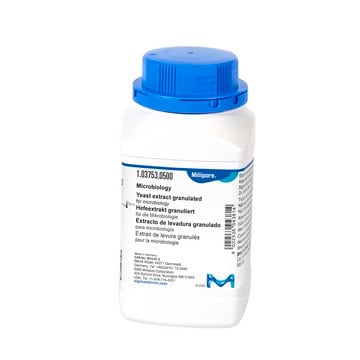Y0875
Select Yeast Extract
for use in microbial growth medium
About This Item
Recommended Products
grade
for molecular biology
Quality Level
sterility
non-sterile
form
powder
technique(s)
microbiological culture: suitable
pH
6.5-7.5(10% solution)
solubility
H2O: 100 mg/mL, clear to slightly hazy, yellow to brownish-yellow
application(s)
microbiology
storage temp.
room temp
suitability
nonselective for Escherichia coli
nonselective for coliforms
InChI
1S/C19H14O2/c20-18(21)11-17-15-8-4-3-7-14(15)16-10-9-12-5-1-2-6-13(12)19(16)17/h1-10,17H,11H2,(H,20,21)
InChI key
GQNBDGXKDJSVGQ-UHFFFAOYSA-N
Looking for similar products? Visit Product Comparison Guide
General description
Yeast extract is used in all solid media, on which stock cultures are maintained, due to its ability in promoting growth of most bacterial contaminants, thereby making them visible to identify. Yeast extract does not enhance the growth of wild-type cells but essential for auxotrophic mutants.
Application
- as a supplement in the minimal sporulating medium (MSL) for the secretory production of human tumor necrosis factor-α (TNFα) using the carboxypeptidase Y (Cpy) signal peptide.
- in the isolation of halophilic archaea.
- as a component of microbial growth medium for cultivation of marine bacterial strain Zobellia uliginosa.
Suitable for use as nutritional source in microbial media.
Other Notes
related product
Storage Class Code
11 - Combustible Solids
WGK
WGK 3
Flash Point(F)
Not applicable
Flash Point(C)
Not applicable
Personal Protective Equipment
Certificates of Analysis (COA)
Search for Certificates of Analysis (COA) by entering the products Lot/Batch Number. Lot and Batch Numbers can be found on a product’s label following the words ‘Lot’ or ‘Batch’.
Already Own This Product?
Find documentation for the products that you have recently purchased in the Document Library.
Customers Also Viewed
Our team of scientists has experience in all areas of research including Life Science, Material Science, Chemical Synthesis, Chromatography, Analytical and many others.
Contact Technical Service










